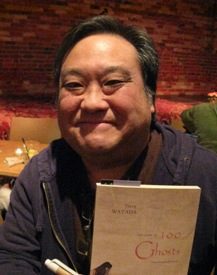
Terry Watada is well-known in the Japanese Canadian community for his monthly column in the Nikkei Voice, a national Japanese Canadian community paper. He has written in all genres (fiction, poetry, drama, prose), edited two anthologies, and is also known as a musician and composer. His sound recordings include The Art of Protest, Birds on a Wing, Living in Paradise, and, Runaway Horses. Watada lives in Toronto. He used to teach at Seneca College.
Watada’s play, “Tale of a Mask,” was first produced in 1993 by the Workman Theatre Group. A revised script was staged in 2008/2009 by fu-GEN, an Asian-Canadian Theatre Organization. Another play, “Vincent” toured Ontario and Manitoba in 1997.
Watada’s non-fiction writing includes Bukkyo Tozen: A History of Jodo Shinshu Buddhism in Canada, 1905-1995 (Toronto: HpF Press : Toronto Buddhist Church, 1996), The TBC: Toronto Buddhist Church 1995-2010 (Toronto: HpF Press, 2010) and a biography for juvenile readers, Seeing the Invisible: The Story of Dr. Irene Uchida: Canadian Scientist (Toronto: Umbrella Press, 1997).
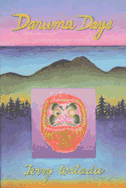
Fiction (Short stories)
Daruma Days: A Collection of Fictionalised Biography
Vancouver, B.C.: Ronsdale Press, 1997.
PS8595 .A789 D37 1997
Publisher’s Synopsis
A brilliant series of linked stories, Daruma Days captures more than a century of Japanese Canadian experience. As has never been done before, Watada recreates the life-stories of the “issei” (the first generation of immigrants) imbued with Japanese tradition and haunted by the uncanny world of the supernatural. Into this world come the “nisei” (the second-generation) who, caught between cultures and loyalties, wander in a mindscape that is neither Canadian nor Japanese. At the heart of it all lies the alienation of the internment camps during WWII, when thousands of Japanese Canadian families were separated and evacuated to the interior of B.C. …
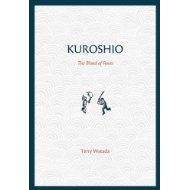
Fiction
Kuroshio: The Blood of Foxes
Vancouver: Arsenal Pulp Press, 2007.
PS8595 .A798 K97 2007
Publisher’s Synopsis (From its website)
Ma misses the sun, warmth and colors of their faraway homeland, but her daughter sees magic in everything — the clouds in the winter sky, the “firework” display when she throws an armful of snow into the air, making snow angels, tasting snowflakes. And in the end, her joy is contagious. Home is where family is, after all.
Kuroshio, meaning “black current,” is the name given to the Pacific Ocean current that Japanese immigrants believe brought them safely to a new life in North America. In this vividly imagined novel based on a true story that spans decades and continents, Terry Watada explores the dark reaches of Issei, or Japanese immigrant, life in Vancouver prior to World War II.
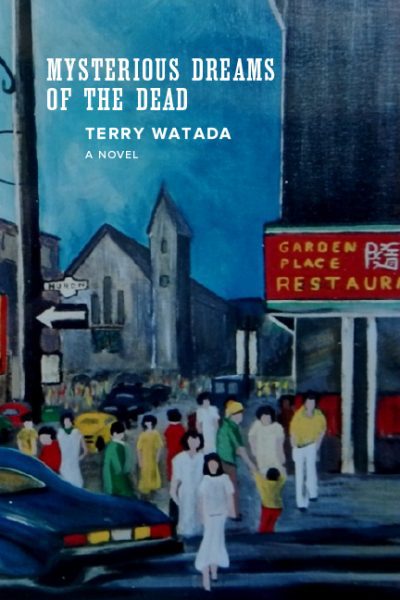
Fiction
Mysterious Dreams of the Dead
Vancouver: Anvil Press, 2020.
Forthcoming June 2020.
Publisher’s Synopsis (From its website)
Ma misses the sun, warmth and colors of their faraway homeland, but her daughter sees magic in everything — the clouds in the winter sky, the “firework” display when she throws an armful of snow into the air, making snow angels, tasting snowflakes. And in the end, her joy is contagious. Home is where family is, after all.
At the heart of Mysterious Dreams of the Dead is the spiritual search for a father who died in a plane crash north of Lake Superior when his son was fifteen. Mike Shintani decides in his early thirties to address the curious circumstances surrounding his father’s death; the senior Shintani’s body was never found, and wolves circled the crash site as if guarding the area.
The impetus for Mike’s search for truth is a diary he found in the basement of his home. It was obviously his father’s, but it was written in Japanese. Mike never knew his father could write Japanese. He himself could neither read nor write the language. He was fortunate enough to enlist the help of Naoko Ito, a Japanese grad student at the University of Toronto. It turned out, the book was a dream diary, filled with poetry, descriptions of the surreal, and the story of a love affair with a woman named Chiemi. Chiemi is at the centre of the elder Shintani’s dreams, and Naoko, after some time, seemingly disappears into thin air. Both appear as ghosts in dreams.
Another great mystery of Mike’s life is the behaviour of one of his best friends, Boku Sugiura, who decides one day to rob a bank, in the name of his grandfather and redress for Japanese Canadians.
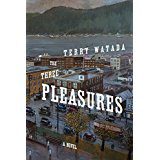
Fiction
The Three Pleasures
Vancouver: Anvil Press, 2017.
PS8594. A798 T47 2017
Publisher’s Synopsis (From its website)
Ma misses the sun, warmth and colors of their faraway homeland, but her daughter sees magic in everything — the clouds in the winter sky, the “firework” display when she throws an armful of snow into the air, making snow angels, tasting snowflakes. And in the end, her joy is contagious. Home is where family is, after all.
1940s Vancouver. The Japanese have just bombed Pearl Harbour and racial tension is building in Vancouver. The RCMP are rounding up “suspicious” young men, and fishing boats and property are soon seized from Steveston fishers; internment camps in BC’s interior are only months away.
Daniel Sugiura, a young reporter for the New Canadian, the only Japanese-Canadian newspaper allowed to keep publishing during the war, narrates The Three Pleasures. The story is told through three main characters in the Japanese community: Watanabe Etsuo, Morii Etsuji and Etsu Kaga, the Three Pleasures. Etsu in Japanese means “pleasure”; the term is well-suited to these three. Morii Etsuji, the Black Dragon boss, controls the kind of pleasure men pay for: gambling, drink and prostitution – the pleasures of the flesh. Watanabe Etsuo, Secretary of the Steveston Fishermen’s Association, makes a deal with the devil to save his loved ones. In the end, he suffers for it and never regains the pleasures of family. And there is Etsu Kaga, a Ganbariya of the Yamato Damashii Group, a real Emperor worshipper. His obsession becomes destructive to himself and all involved with him. He enjoys the pleasure of patriotism until that patriotism becomes a curse.
Fiction (Graphic novel)
The Sword, The Medal and the Rosary
Illustrated by Kenji Iwata.
Toronto: HpF Press, 2013.
FC106 .J3 Z7 2013
Publisher’s Synopsis
… based on the true exploits of Yasuo Takashima, an adventurous Japanese Canadian pioneer, who lived through the 1907 Vancouver Race Riots as a combatant, World War I as a decorated soldier, World War II as an internee and the Japanese Canadian post-war diaspora as an exile. The sword, the medal and the rosary, mementoes from his various experiences, became symbols of his life. Thus their fate became his fate and perhaps the fate of all Japanese Canadians.
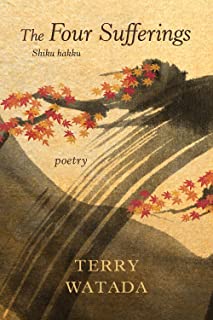
Poetry
The Four Sufferings: Shiku hakku
Toronto: Mawenzi House, 2020.
E-book (Access restricted to TMU community members)
Publisher’s Synopsis (From its website)
Ma misses the sun, warmth and colors of their faraway homeland, but her daughter sees magic in everything — the clouds in the winter sky, the “firework” display when she throws an armful of snow into the air, making snow angels, tasting snowflakes. And in the end, her joy is contagious. Home is where family is, after all.
In Japanese, shiku hakku means to endure, an expression that originates in Buddhism. The Four Sufferings links Terry Watada’s past and present while acknowledging the fundamental suffering of human existence—in birth, aging, illness and death, as well as the suffering endured in daily living—in mundane frustrations, desire, and separation. As well, it celebrates love, and in the end it comes to seek an enlightened state of acceptance. Rise above life’s hardships and rejoice in the state of life is the overall theme of this collection.
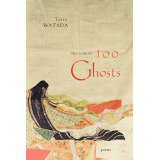
Poetry
The Game of 100 Ghosts
Toronto: TSAR, 2014.
PS8595 .A798 G35 2014
Publisher’s Synopsis
Inspired by an old Japanese parlour game of the Edo period (1603-1868), The Game of 100 Ghosts is a lyrical tribute to the poet’s friends and relations who recently departed their lives. In the game, participants gather in the dark at night and sit around 100 lit candles. Each player tells a ghost story, after which a candle is snuffed out. The last candle ends the spiritual evocation, which the participants hope will summon a supernatural being. This wonderful collection then evokes the spirits of lost friends and relations while paying tribute to a tradition.
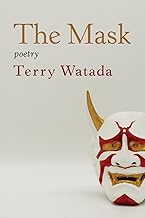
Poetry
The Mask
Toronto: Mawenzi House, 2023.
forthcoming
Publisher’s Synopsis (From its website)
The mask has become emblematic of the 2020 pandemic. It is also an important symbol of Japanese classical culture and tradition, a central motif of Noh Theatre as well as Kabuki. For Terry Watada, the mask not only conceals but reveals hidden truths of the bearer. It is with this mind that he wrote the poems for The Mask. With a deep sense of grief, tragic loss and injury, and love and respect for family history, he expresses the isolation of the times, the vagaries of old age, and the mysteries of the mystical. The themes of immigrant realities, racism and elusive identity in Canadian society are embedded in the poems which utilize vivid imagery, minimal or untethered punctuation, and colourful use of language. All come together to express the reality of his life.
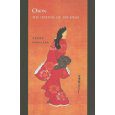
Poetry
Obon: The Festival of the Dead
Saskatoon, Sask.: Thistledown Press, 2006.
Publisher’s Synopsis (From its website)
Ma misses the sun, warmth and colors of their faraway homeland, but her daughter sees magic in everything — the clouds in the winter sky, the “firework” display when she throws an armful of snow into the air, making snow angels, tasting snowflakes. And in the end, her joy is contagious. Home is where family is, after all.
Terry Watada crafts an artful mix of Buddhist tradition, Japanese-infused language and rich cultural history, where death is but one stop in the cyclical, timeless nature of a life. His is a warm tribute to the thin veil between worlds where sorrow is as transient as happiness. …

Poetry
Ten Thousand Views of Rain
Saskatoon, Sask.: Thistledown Press, 2001.
PS8595 .A798 T46 2001
Publisher’s Synopsis
This beautiful collection of lyrical poems explores the dynamic interaction of Japanese and Canadian cultures, utilizing the powerful and universal elements of weather, art and family. …

Poetry
A Thousand Homes
Edited by Beverley Daurio.
Stratford, Ont.: Mercury Press, 1995.
PS8595 .A789 T464 1995
Awards and Honours
1995 Gerald Lampert Memorial Award (Nominated)
Anthology (Drama)
“The Tale of a Mask.” In Canadian Mosaic: 6 Plays. Toronto: Simon & Pierre, 1995.
PS8315 .C35 1995
Anthology (Non-fiction)
Collected Voices: An Anthology of Asian North American Periodical Writing
Selected and edited by Terry Watada.
Toronto: HpF Press, 1997.
Links
Publisher Anvil Press
Publisher Arsenal Pulp Press
Publisher Mawenzi House (formerly TSAR)
Publisher Ronsdale Press
Publisher Thistledown Press